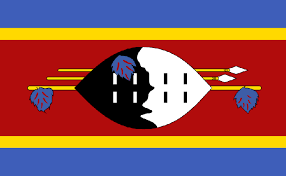Language/Swati/Grammar/Pronouns
Hi Swati learners! 😊
In this lesson, we will learn about pronouns in Swati grammar. Pronouns are words that replace nouns to make sentences less repetitive. Swati pronouns are used to make a sentence clearer and less ambiguous. Let's get started!
Consider exploring these related pages after completing this lesson: Say Hello and Greetings in Swati, Questions & How to Use Have.
Swati Personal Pronouns[edit | edit source]
Personal pronouns represent people or groups of people. They are essential in communicating effectively in Swati. The table below shows the personal pronouns in Swati.
| Swati | Pronunciation | English |
|---|---|---|
| Mi | mi | I |
| Wa | wa | You (singular) |
| U | u | He/She/It |
| Si | si | We |
| Nina | ni-na | You (plural) |
| Ba | ba | They |
Here is an example to understand how to use Swati personal pronouns properly.
- Person 1: Uyazi uLindiwé? (Do you know Lindiwe?)
- Person 2: Yebo, ngim'yazi. (Yes, I know her.)
In the example above, Person 1 uses the Swati personal pronoun "u" instead of repeating the name Lindiwe, making the conversation more efficient.
Swati Demonstrative Pronouns[edit | edit source]
Demonstrative pronouns replace or point to something specific that has already been introduced in the conversation. These pronouns help to avoid repeating a previously mentioned noun.
The Swati language has four demonstrative pronouns, which are either singular or plural, masculine or feminine, and for proximity or distance.
| Swati | Pronunciation | English |
|---|---|---|
| Le | leh | This (singular, masculine) |
| Lami | lah-mee | This (singular, feminine) |
| Lona | loh-nah | That (singular, masculine) |
| Lenu | leh-noo | That (singular, feminine) |
| Lalela | lah-leh-lah | These (plural, masculine) |
| Laleli | lah-leh-lee | These (plural, feminine) |
| Lona liphela | loh-nah lee-peh-lah | Those (plural, masculine) |
| Lenu lenyama | leh-noo leh-nyah-mah | Those (plural, feminine) |
Here is an example of how to use demonstrative pronouns:
- Person 1: Libhodi lakithi liyahluphekela. (Our school is struggling.)
- Person 2: Lona labathathu, anifundanga njani kanti?
(Those three, how are they not learning?)
In the example above, Person 2 uses the Swati demonstrative pronoun "Lona" instead of repeating the phrase "those three," making the conversation more efficient.
Swati Reflexive Pronouns[edit | edit source]
Reflexive pronouns emphasize a noun, indicating that the person or thing performing the action is also receiving the action. The table below shows the reflexive pronouns in Swati.
| Swati | Pronunciation | English |
|---|---|---|
| Ngihlatsiwe | ngih-lah-tsih-weh | Myself |
| Uyihlatsiwe | oo-yih-lah-tsih-weh | Yourself (singular) |
| Uyihlatsiwe | oo-yih-lah-tsih-weh | Himself/Herself/Itself |
| Sikhatsiwe | sih-kah-tsih-weh | Ourselves |
| Nina niyihlatsiwe | nee-nah nee-yih-lah-tsih-weh | Yourselves (plural) |
| Bayihlatsiwe | bah-yih-lah-tsih-weh | Themselves |
Here is an example to understand how to use Swati reflexive pronouns properly:
- Person 1: Ngizohlala ngikhuluma emfuleni. (I will always speak truthfully.)
- Person 2: Uyakhathazeka uButhelezi. (You are only worried about yourself.)
In the example above, Person 2 uses the Swati reflexive pronoun "uyihlatsiwe" instead of repeating the noun "Buthelezi."
Swati Possessive Pronouns[edit | edit source]
Swati possessive pronouns indicate possession or belonging. The table below shows the possessive pronouns in Swati.
| Swati | Pronunciation | English |
|---|---|---|
| Wami | waa-mee | Mine |
| Wako | waa-koh | Yours (singular) |
| Wakhe | waa-kheh | His/Hers/Its |
| Wethu | waa-teh-heh | Ours |
| Wanina | waa-nee-nah | Yours (plural) |
| Wabo | waa-boh | Theirs |
Here is an example to understand how to use Swati possessive pronouns properly:
- Person 1: IFacebook yakho ili ngcono kakhulu kunami. (Your Facebook is better than mine.)
- Person 2: Ewe, wami ngeke ngifise. (Yes, mine is no good.)
In the example above, Person 2 uses the Swati possessive pronoun "wami" instead of repeating the phrase "my Facebook."
Swati Reciprocal Pronouns[edit | edit source]
Reciprocal pronouns are used to indicate mutual actions or feelings between two or more people. In Swati, reciprocal pronouns are formed by adding "na" to pronouns. For example, "sina" means "each other" in Swati.
Here is an example to understand how to use Swati reciprocal pronouns:
- Person 1: Uma kufika abantu abathathu, laba abavumelekanga bakho bona bakhona labathathu baphoxe phezulu kakhulu. (When three people arrive, those who do not agree with you they will talk up a storm against one another.)
- Person 2: Kuthathwa kubandlululwa kahle lapho lwaphinda kuthiwa "Sina semaningi." (There was a lot of conflict there until they said "We are all together.")
To improve your Swati Grammar, you can also use the Polyglot Club website. Find native speakers and ask them any questions!
Sources[edit | edit source]
Other Lessons[edit | edit source]
- Questions
- Conditional Mood
- Future Tense
- Negation
- Give your Opinion
- How to Use Have
- Adjectives
- How to Use Be
- Plurals

